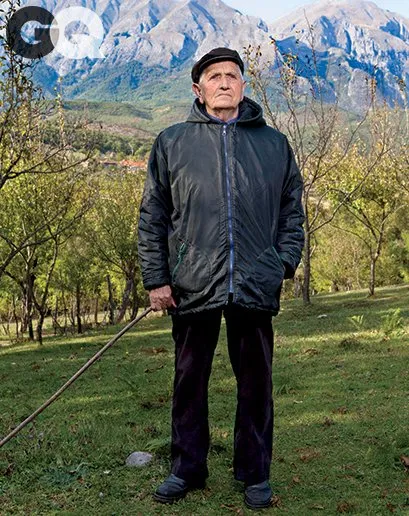People who know a little about Albania associate it with a number of distinctive elements: the gorgeous beaches, the stunning views from mountains, the painful memories of the communist dictatorship still very visible everywhere, the cement bunkers that are silent and ever-present travel companions throughout the country, and the hospitability of the people. All of this comes from first-hand experiencing of the country and its people, as well as from conversations with the locals. Some things though are neither noticed so easily, nor discussed widely. This is a post specifically touching one of those subjects - it has recently received a very wide coverage in Western media, but it is little discussed among Albanians, for reasons I still cannot tell. The Sworn Virgins.

Image source – This photograph however was taken by Jill Peters and appeared in an article in veriu.com. To find Peter’s collection, please have a look at the last paragraph in this post.
The phenomenon dates back to the beginning of the 15th century, when customary law (Kanun, in Albanian) prevailed in Northern Albania. According to this set of codes and laws, women were regarded as property of their family men. Women were stripped off of almost all rights – they could not inherit property, they could not travel without a male companion, they could not vote, they could not swear, drink, or smoke; and they could not even enter specific premises which were designated for men only. However, there was a way out anticipated by the Kanun - a woman could take an oath of celibacy and continue to live the rest of her life dressed as a man and enjoying all men privileges. This woman was not supposed to have sex, marry, or have children. They didn’t have to undergo a sex-change procedure, though I doubt it would ever cross the minds of the 15th-16th century Albanians. It is however the only case in Europe when cross-dressing is recognized officially and the cross-dresser is accepted by society with all privileges such decision brings. The phenomenon had been noticed in Macedonia, Bosnia, and Croatia, but it has disappeared.
There were plenty of reasons to force a woman take such decision: the family did not have a male heir and the sworn virgin wanted to inherit the family’s wealth and property; they wanted to escape an arranged marriage; they did not want to marry at all and continue to stay with their paternal families; they wanted to actively participate in community without being regarded as lesser humans without any rights. Adopting a male identity, posture, clothing, cutting their hair, and swear celibacy for the rest of their lives, allowed these women to do all of the above. Their number was considerable in the past, and the phenomenon quite wide-spread in Northern Albania, but currently there are only a few sworn virgins left. The increased number of legal rights granted to women, especially during the communist dictatorship times that was actually favorable to gender equality, did somehow omit the need for sworn virgins. The few sworn virgins left are mostly above their fifties, and the phenomenon is gradually disappearing.
There are plenty of articles published by international media online, and I would strongly suggest a recent 2015 film of the Italian director Laura Bispuri based on a novel with the same title by Albanian writer Elvira Dones - Sworn Virgin (IMBd entry here). There is also a very good documentary of the German Director Anabela Angelovska – Hakie Haki (IMBd entry here). Also, for the more curious, photographer Jill Peters who travelled to the Albanian Alps in Northern Albania multiple times, has published a stunning collection of sworn virgins in her website.
From a feminist perspective, the decision to become a sworn virgin in order to be granted all men privileges in a strictly patriarchal society is seen as a way to somehow cheat the system. The counterargument however is that little did they do to actually oppose the system - they simply chose the easiest way of how to make the system work for them. Personally, I believe in the times when the phenomenon peaked, there was little to do in terms of opposing a very strongly consolidated patriarchal system. I do think of these women as proto-feminists in their context. Of course, the sacrifice they had to make was immense, and giving up their womanhood to take over men privileges can be seen as counterintuitive in terms of feminism, but taking into account how little there was to be done, it was revolutionary of them. I am open to discussion though.
Thank you for reading. Please, drop a line in the comments section if you need more information, or if you simply want to discuss about it.